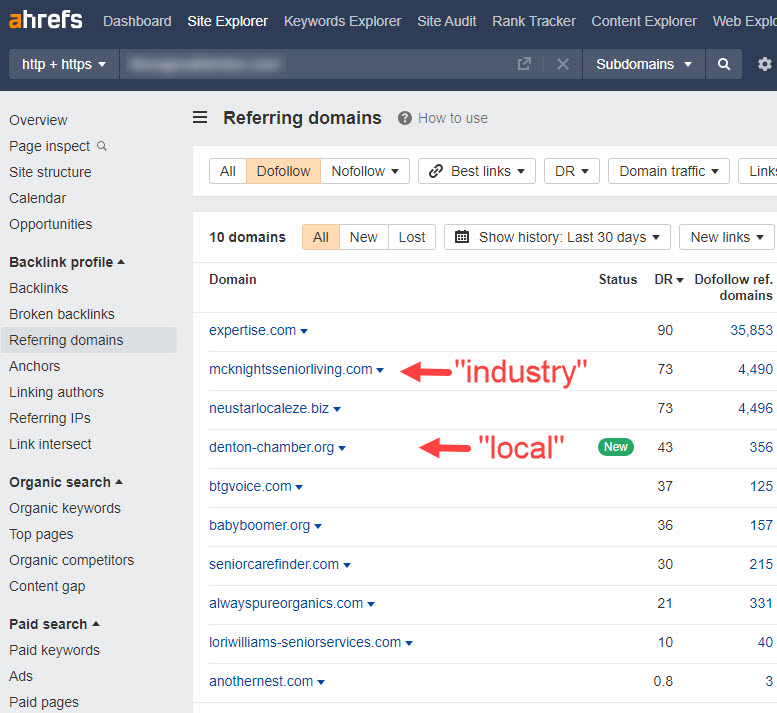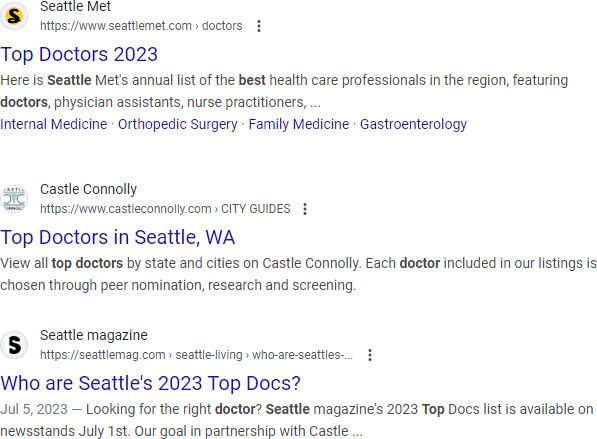If you want to rank more than a klick or two from your perimeter, you’ll need a few links – from other sites to your site. Most of those sites should be relevant to what you do, where you are, or both.
Those links probably don’t need to be hard to get, you won’t need a ton of them, and you may not even need them at all right now to make big gains. How important they are depends on a lot of factors. But you will need some solid links sooner or later, as rebar to support your other SEO work. Otherwise, you’ll have a hard time getting ahead of your tougher competitors, staying ahead of them, and preventing rankings rot. A version of this is true if you’re a professional SEO-er: you need to do some work to help your clients land a few links.
There’s no “best” type of link opportunity, for a lot of different reasons. You’ll want some “local” links, some “industry” links, some that are both, and even some that are neither. Be omnivorous, and don’t overthink it. What do I mean by a “local” link? Just about anything, but examples include charities, chambers of commerce, schools, other businesses, and media that are based in or focus on your area. I’ve found links from those sorts of sites to be more beneficial than others are. “Industry” links can come from professional organizations, trade magazines, blogs in your niche, conferences, and so on.

At the same time, you might be frozen by too many choices or just don’t know where to start. If it helps you get unstuck: I suggest focusing more on the local link opportunities. In my experience, they’re more likely to help your Google Maps and organic rankings, and even to make your business less dependent on those local rankings in the first place.
Big caveat emptor: see what works best for your business. I hope you use my advice as a starting point, but you don’t need to take my word for anything. Try to maintain a tiny trickle of local AND non-local links, work on the rest of your SEO, and see what results you get after at least a few months.
Anyway, why might the average local link help you in a way the average “industry” link might not? A few reasons:
1. Local links are likely to add up and to come from a variety of sites. That’s because they tend to be simpler or cheaper to acquire, and because you’re more likely to get a few of them, rather than to put all of your time and money into pursuing a link from a high-flying “authority” site. Any one link usually doesn’t help you in a noticeable way, whereas accruing links over time usually does pay off after a few months.
2. Local links are more likely to point to a critical page on your site rather than point to a blog post or other buried resource that probably doesn’t have any money riding on it. As I’ve explained in various ways over the years, your husbandry of your links sometimes matters even more than the quantity or quality of the links themselves. In the desert, it doesn’t matter how much water you’ve got if you don’t conserve it or use every drop to get you a little farther to the next watering hole.
3. Many or most locally operating businesses have at least a couple of links from local sites, regardless of whether SEO is on the minds of those business owners, whether they tried to get those links, and whether they even know they have those links. In other words, local links are somewhat more likely to reflect the competitive landscape of businesses that aren’t trying to goose their rankings. In general, Google tries (often poorly) to represent online the pecking order that exists offline. As usual, I’m not saying that’s how it should be, but that seems to be the way it is.
4. A corollary of the last point: local links are less likely to be acquired by means that Google considers unnatural or questionable. Those subjective, up-for-debate means include buying a link, doing a good deed only for the link, guest-posting only for a link, swapping links with many sites, and so on. Everyone wants a link from USA Today, Forbes, Business Insider, and other big names, but I can tell you from first-hand experience that you can buy your way into big publications like those (I’m not naming names today). To varying degrees you can do likewise with local sites (and get local links), too, but those just aren’t as alluring a target for most SEOs. The prison guards try to be everywhere at once, but they can’t be. So they figure that most inmates want to jump the razor-wire fence and make a run for it, while fewer of them want to sneak into the kitchen or wood shop to make a shovel and a shiv.
5. Assume for a moment (as I do) that Google has a harder time telling where you are than what you do. Your service area is easier to fake than your services are. You can’t pretend to fix teeth if you fix dishwashers. If you do, you won’t get paid, you will get rough reviews, and you may get into legal trouble. Anyway, if my educated guess is correct, then a local link somewhat confirms for Google at least one part of your story: your location and stomping grounds.
6. Local sites are more likely to be curated by people who care about the communities the site is geared toward. An old-timer or by the Unofficial Mayor of East Tuna Fish is more likely to know what’s a true local business and what’s not.
7. You’re more likely to keep a local link long-term, and maybe even more likely to get that link in the first place. Because smaller, locally-focused sites are less in the crosshairs of SEOs and their frequent excesses and abuses, those sites’ policies are less likely to change over time. Those sites are less likely to slap “nofollow” or “rel=sponsored” onto links, or to stop linking out altogether. (For an example of the opposite, look no farther than the example of what the BBB did some years ago, where even longtime BBB-accredited businesses had their links nofollowed quietly.) A local site is less likely to be a pool where a few bad swimmers step in with filthy sneakers and relieve themselves in the water and ruin the place for everyone else.
8. Local sites are more likely to get you some non-Maps visibility through barnacle SEO. It’s more plausible, then, that you’re trying to hang your shingle on the site just because it’s smart marketing or networking, rather than because you just want the link.

9. Local sites are more likely to glean you some non-Google visibility. This is yet another form of the paradox that I’ve seen at work again and again (but haven’t totally figured out): the more you behave as a business owner who cares about marketing but doesn’t care much about Google, the more likely Google is to dig you. Hedge a little and you’ll be OK.
—
What’s my advice? Stop with the fancy footwork. No more infographics, complex and time-consuming outreach to “influencers,” and pestering bloggers to take your guest post – at least for now. Keep it simple. Contribute to a couple of local charities, maybe join a local chamber of commerce or similar organization, get listed on the local newspaper / birdcage liner, and see where that gets you. When you research competitors’ links, see what local sites link to them. Pick a couple of ideas that seem doable, do them, and fan out from there. It’s great if you’re gung-ho about getting more links, but you don’t need to rush. Figure out a pace that works for you.
What specific links, or types of links, or types of link-scrounging strategies seem to have served you best? What’s been a boondoggle? Leave a comment.


Recent Comments